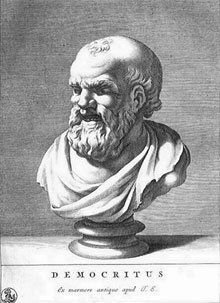
Democritus
Democritus (460-370) was the most important of the pre-Socratics. He proposed that all matter is made of atoms, of varying sizes and weights, infinite in number, and moving in empty space (kenos). He further held that atoms interact with each other mechanically to produce the properties of material bodies. However, he considered certain properties to be consequences of the intrinsic structure of atoms, rather than their interactions with others: thus salt atoms were supposed to be sharp and pointed, to explain the taste of salt.
All interactions among atoms were in accordance with universal laws, with no need for a first purpose or final cause as conjectured by Plato and Aristotle. Atoms, although extended, were supposed indivisible and indestructible. Democritus held that knowledge derived from the senses could be misleading (it was ‘bastard’ knowledge), and that only through the intellect could fundamental truths be determined. His philosophy was closely allied to that of his teacher Leucippus, and was an important influence on Epicurus. He also made important contributions to mathematics, writings texts on numbers, including irrational numbers, and geometry, none of which however survived.
Links
Stanford encyclopedia of philosophy: Democritus >
Internet encyclopedia of philosophy >
Wikisource. Diogenes Laertius: Lives of the Eminent Philosophers >
